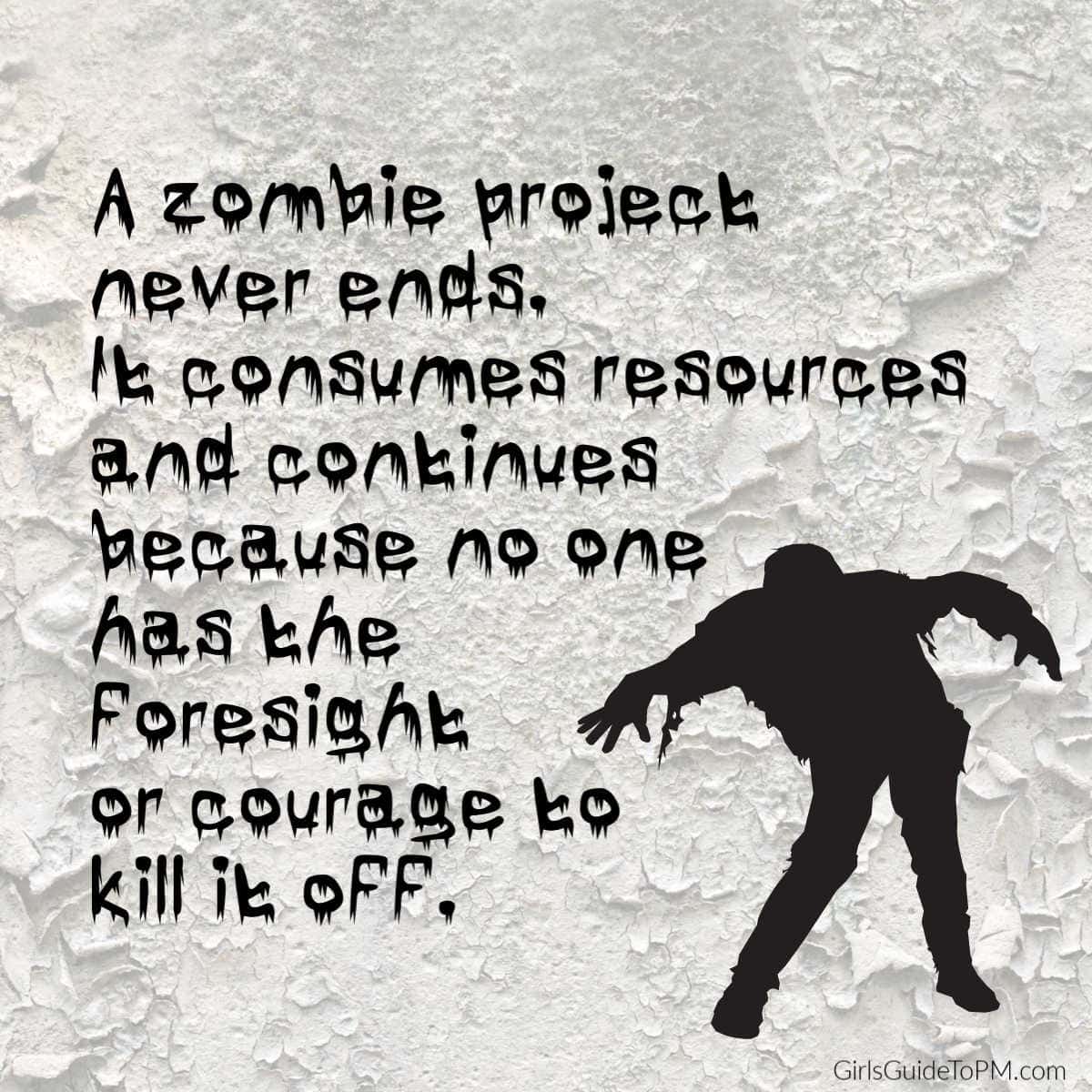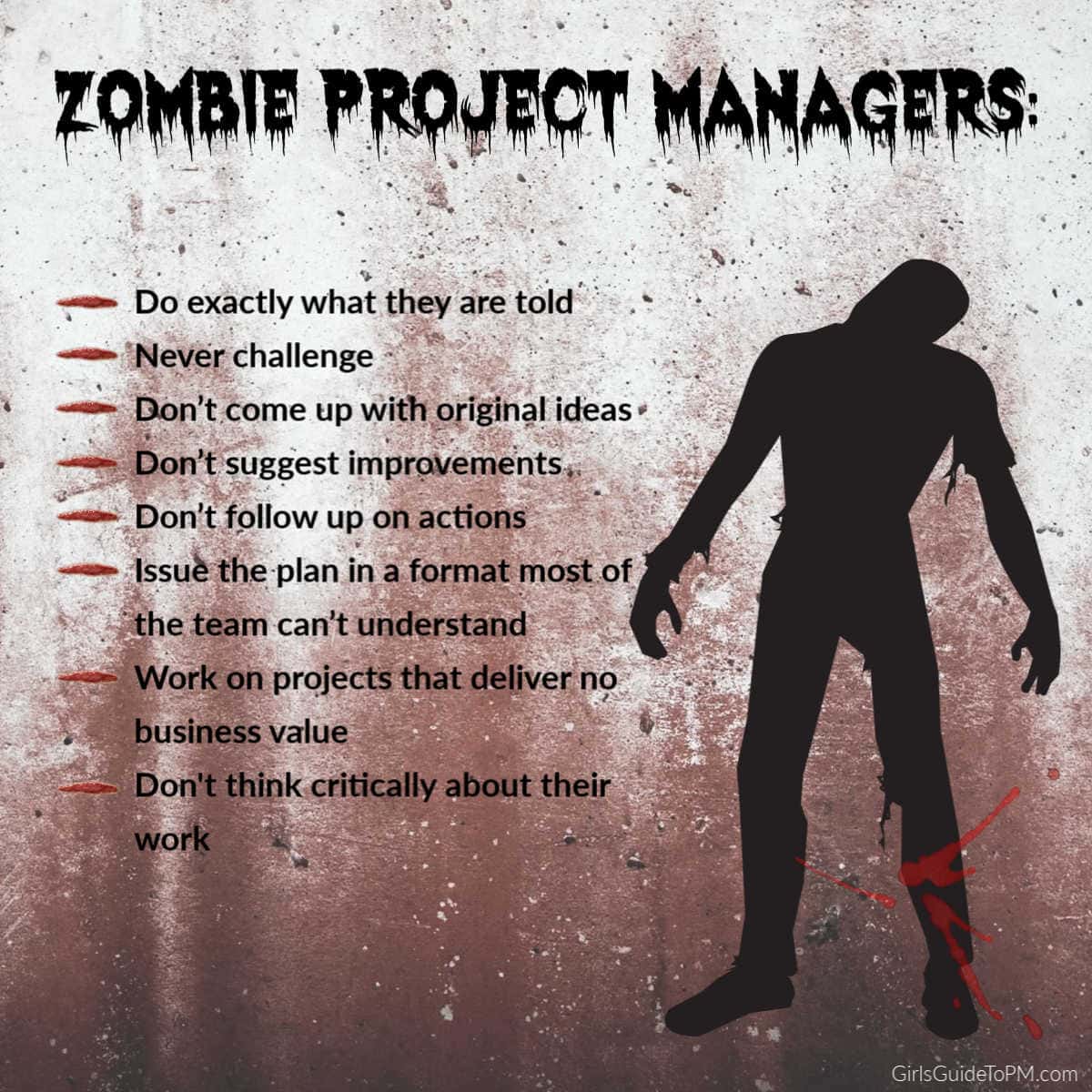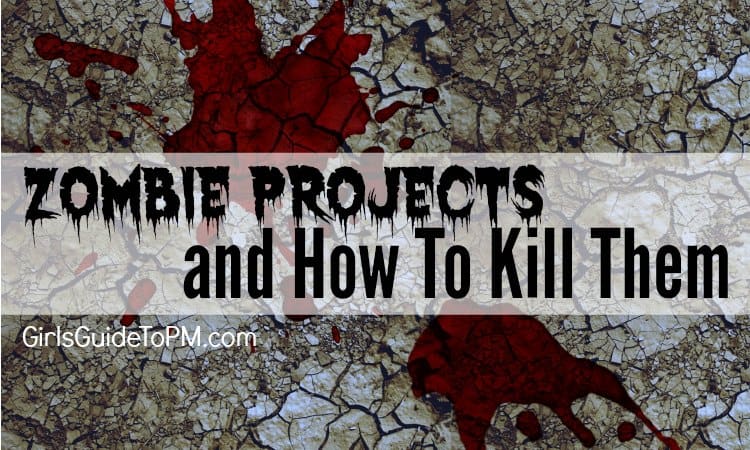Zombie Projects and How to Kill Them
One of the first things that project managers learn on training courses is that a project has a start, a middle and an end. Unfortunately, outside the classroom you’ll come across projects that don’t work like that.
A KPMG survey* reports that only 30% of organizations are likely to deliver projects on time.
When the time allocated to a project expands — and then expands again — and again — you might be looking at a zombie project.
What is a zombie project?
What do I mean by ‘zombie project’? Here’s a definition.
A zombie project is one that never ends. It simply consumes resources and carries on because no one has the foresight (or courage) to kill it off.
Don’t be the project manager that lets a project go on and on by accepting every scope change and picking up all the operational work as well as the requests for new functionality, additions or improvements.
That doesn’t make you a project manager, it makes you an operational team leader – although you could find that there is a useful long-term product management role for you if you prefer this way of working.
Zombie PM is a term I came up with in 2010 when I put together a project management alphabet.
And now I have kids who play Minecraft, we seem to talk about zombies and zoombies (the baby zombies who are apparently very fast) pretty much every mealtime. At least, that’s what it feels like!
How to spot a zombie project
Projects and operational work coexist on large programs so it is quite likely that at some point in your project management career you will be asked to get involved with operational work. And it may feel like your project is never-ending.
However, zombie projects are not operational, day-to-day work. They are projects that:
- lack structure
- have poor management
- have poor oversight; and
- lack of governance.
Like the zombies in films, they are mindless. The project managers and the teams leading them don’t ask the basic question – why? Why should we do it like this? Why are we doing this project at all?
If these projects can’t be rescued and turned into something useful, they should be closed down. After all, they are sucking up valuable resources that could be put to better use working on something else.
Read next: How to Save a Failing Project (ebook)

Killing those zombie projects — a case study
So you’ve found yourself on a zombie project? Take heart, you aren’t the only one.
“I used to have a position as an advisor to a U.S. Government PMO,” says Derek Huether, an enterprise
He continues:
“It was a traditional PMO, filled with certified professionals doing very good work in very specific areas of expertise. We had budget specialists, schedule specialists, earned value specialists, and even contract specialists. The projects being managed were very traditional in nature, with the exception of one thing. They never ended!”
He might have been able to forgive the long timescales if this PMO was managing projects committed to the construction of battleships or the next generation of an interstate highway system.
“I realize these would take years to plan and implement,” he says. “But this PMO was managing software applications, both in development and in operation. So, why is it these projects never ended and never seemed to deliver anything of value? Why is it they just wouldn’t die? It is because, of course, these were zombie projects.”
Faced with a set of projects that were simply taking up space, Derek had to make a choice.
“I would like to say I killed off all of these zombie projects or at least put them all back on course to delivering value to the taxpayers,” he says. “Alas, if you are a connoisseur of zombie movies like I am, you know there is only one thing you can do. Divide and conquer.”
How to get that zombie project finished
Derek identified one small project that he knew a small team could bring back from the brink.
“We identified what deliverables were most important to the project sponsor,” he says.
“Then we established a small cross-functional team, asking some members to work outside of their functional expertise, to allow the flow of work to be regulated.”
Derek took an
“We asked the team to demonstrate to the project sponsor what they had got done in the previous week, to allow the sponsor to accept or reject what was done and provide feedback and insights into shifting priorities,” he says.
Derek and his team established regular weekly deliveries of product, to build onto previously delivered items, and they clearly identified a project end date.
“Whatever we had done by that date would be it, without new project sponsorship and the creation of a new project following the same parameters of our new non-zombie project,” he says.
As a result, he brought this particular zombie project back under control and ensured it delivered something of value to the project sponsor.
You can do the same: don’t let your project turn into a zombie project taking up resources and energy that could be better used elsewhere.
You might not be able to stop that from happening, but at the very least recognize when it has happened and recommend that the project is closed down. Otherwise you’ll be mindlessly supporting a project that is going nowhere and has nothing to offer. Cut your losses and run!
Get a free project closure document to help make the case that your project should be stopped!

How to spot a zombie project manager
We might all recognize the zombie project, but what about the people leading projects?
A zombie project manager has the following ‘management style’:
- They do exactly what they are told without challenging anything
- They don’t come up with original ideas
- They don’t suggest ways to improve the project management processes
- They don’t follow up on actions – they simply assume they will get done
- They update and issue the plan in a format that most of the team can’t read or understand
- They work on projects that deliver no business value
- They go through the motions of being a project manager but without any critical thinking applied.
If this sounds like someone you have worked with, then you know what a Zombie Project Manager is like.
Project management isn’t rocket science, and it shouldn’t be hard to get right. But you do need to apply an element of intelligence and critical thinking to what you do.
Projects need to be shepherded along, sponsors don’t always know best, and sometimes you have to suggest that your project is stopped.
Zombie Project Managers can’t do this. They operate in a completely textbook fashion, without applying any logic, context, or thought to how to do things in the most effective way.
One of my favorite sayings that we overuse at my company is ‘no plan survives contact with the enemy.’ Zombie Project Managers follow the plan, regardless of the changing environment around them.
Fortunately, most of the people I’ve worked with over the years have been switched on and very un-Zombie. I haven’t come across many Zombie Project Managers, but I know they are out there (cue spooky music).
I hope you don’t have any in your organization, either!
* The Future of Project Management Global Outlook 2019 (KPMG). Report was available at https://home.kpmg/au/en/home/insights/2019/11/future-of-project-management-global-outlook-2019.html but as at December 2022 the link is no longer directing readers to the report.
A version of this post first appeared on the BCS website. Zombie images are from BenBlogged.com.

